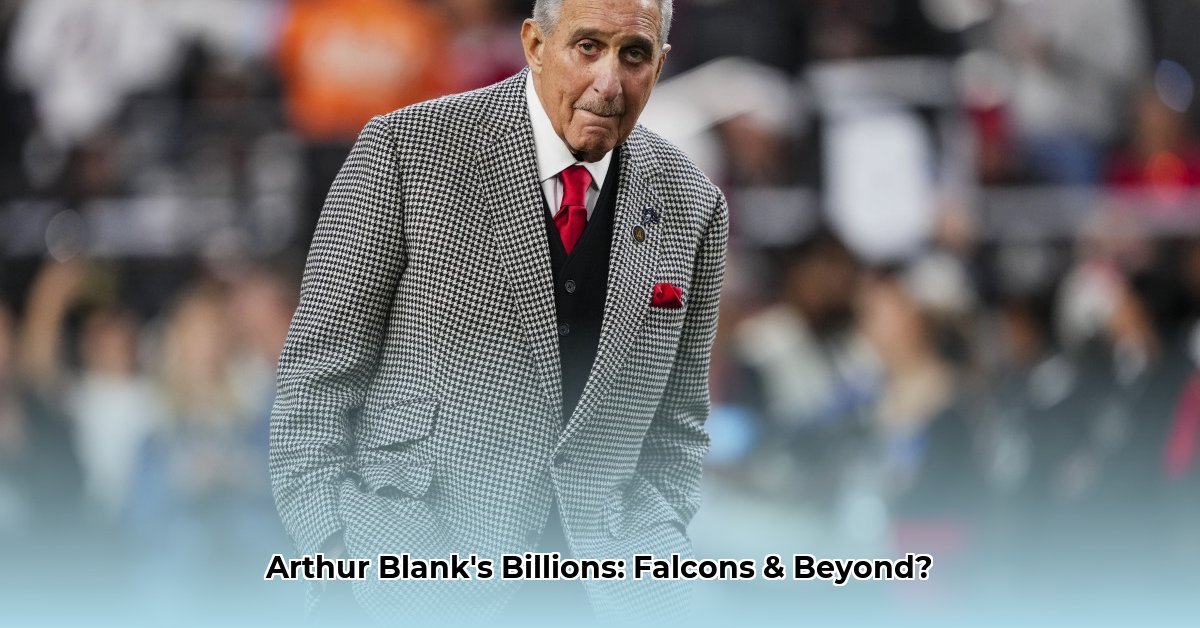
From humble beginnings co-founding Home Depot to owning the Atlanta Falcons, Arthur Blank’s journey exemplifies the American dream. His net worth, estimated in the billions, reflects not only shrewd business acumen but also a strategic understanding of the NFL’s complex financial landscape. This isn't just a story of wealth accumulation; it's a case study in building a lasting legacy within the fiercely competitive world of professional sports.
Arthur Blank's Business Journey: From Home Depot to NFL Ownership
Blank's co-founding of Home Depot in 1978 laid the foundation for his immense wealth. The retail giant’s success stemmed from a simple yet powerful concept: providing high-quality home improvement products at competitive prices. This innovative business model, coupled with Blank's keen understanding of retail and consumer behavior, propelled Home Depot to unprecedented heights, generating significant personal wealth for Blank in the process. This success wasn't a fluke; it was the result of a long-term vision, meticulous planning, and a fierce commitment to delivering exceptional value to customers. His experience at Home Depot instilled in him the principles of fiscal responsibility and long-term strategic thinking, shaping his approach to NFL ownership. But how did this translate into the world of professional sports?
Acquiring the Atlanta Falcons: A Strategic Investment
Acquiring the Atlanta Falcons in 2002 wasn't merely a matter of purchasing a sports team. It was a strategic investment in a brand, a city, and a passionate fanbase. Blank's substantial net worth, largely built on Home Depot's success, provided the necessary capital for this considerable undertaking. However, the acquisition was about far more than simply possessing a professional football team. It was about building a legacy, investing in the community, and fostering a sustainable, profitable organization within the competitive NFL environment. Did Blank's Home Depot experience equip him for the unique landscape of NFL ownership? His subsequent actions suggest a resounding yes.
Blank's Impact on the Falcons: Mercedes-Benz Stadium and Beyond
One of Blank's most visible achievements is the construction of Mercedes-Benz Stadium. This state-of-the-art facility is not only a stunning architectural marvel but also a significant financial investment, showcasing his commitment to providing a world-class experience for both players and fans. The stadium's design incorporates innovative features boosting revenue streams and fan engagement. But Blank's influence extends beyond bricks and mortar. His focus on building a strong organizational culture and attracting top-tier talent has, while not always resulting in on-field success, demonstrably strengthened the Falcons’ brand and long-term prospects. Does this strategy always lead to Super Bowl victories? No, but it’s a foundation for sustained success in a competitive league.
The Broader NFL Context: Competitive Balance and Financial Strategies
Blank's success, however, highlights the ever-present challenge of competitive balance in the NFL. His considerable wealth allows him to invest significantly more in the Falcons than teams owned by less affluent individuals. While the league's salary cap aims to level the playing field, the disparities in owner wealth can significantly impact team spending and long-term competitiveness. This issue, far from unique to the Falcons, raises important questions about the league’s long-term sustainability and fairness. What innovative strategies can the NFL implement to mitigate this imbalance? This is a perpetual challenge, constantly impacting the league’s dynamism.
Decoding Arthur Blank's Net Worth: A Multifaceted Empire
Precisely calculating Arthur Blank's net worth remains challenging. His wealth stems from a diverse portfolio including Home Depot stock, the Atlanta Falcons, real estate holdings, and other investments. Public estimates fluctuate, reflecting the dynamic nature of his holdings and the complexities of valuing a professional sports franchise, but it’s safe to say it places him among the wealthiest individuals in the NFL, and the world. It’s not simply a matter of tallying individual assets; it’s a representation of decades of strategic investments and calculated risks.
Conclusion: A Legacy Beyond the Billions
Arthur Blank transcends the label of simply a “billionaire NFL owner.” His journey embodies the spirit of American entrepreneurship, showcasing the impact of strategic vision, calculated risk-taking, and a deep commitment to building lasting value. His influence extends far beyond the football field, impacting the city of Atlanta and shaping the future of the NFL. His success serves as a compelling case study in the intersection of business acumen and sports ownership, offering valuable lessons for aspiring entrepreneurs and sports executives alike. His legacy, therefore, encompasses far more than just his net worth: it's the enduring impact of a shrewd businessman and visionary leader.
Key Takeaways:
- Arthur Blank's success demonstrates the synergistic power of combining entrepreneurial vision with strategic sports management.
- His investment in the Atlanta Falcons and Mercedes-Benz Stadium showcases the long-term perspective needed for success in the NFL.
- The issue of competitive balance highlights the complexities and challenges that exist within the NFL financial ecosystem.